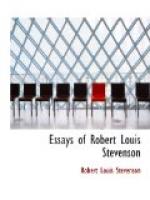[Note 8: Conduct is three parts of life. In Literature and Dogma (1873) Matthew Arnold asserted with great emphasis, that conduct was three-fourths of life.]
[Note 9: The sight of a pleasant arbour. Possibly a reminiscence of the arbour in Pilgrim’s Progress, where Christian fell asleep, and lost his roll. “Now about the midway to the top of the hill was a pleasant arbour.”]
[Note 10: “Miching mallecho.” Hamlet’s description of the meaning of the Dumb Show in the play-scene, Act III, Sc. 2. “Hidden treachery”—see any annotated edition of Hamlet.]
[Note 11: Burford Bridge ... Keats ... Endymion ... Nelson ... Emma ... the old Hawes Inn at the Queen’s Ferry. Burford Bridge is close to Dorking in Surrey, England: in the old inn, Keats wrote a part of his poem Endymion (published 1818). The room where he composed is still on exhibition. Two letters by Keats, which are exceedingly important to the student of his art as a poet, were written from Burford Bridge in November 1817. See Colvin’s edition of Keats’s Letters, pp. 40-46.... “Emma” is Lady Hamilton, whom Admiral Nelson loved.... Queen’s Ferry (properly Queensferry) is on the Firth of Forth, Scotland. See a few lines below in the text, where Stevenson gives the reference to the opening pages of Scott’s novel the Antiquary, which begins in the old inn at this place. See also page 105 of the text, and Stevenson’s foot note, where he declares that he did make use of Queensferry in his novel Kidnapped (1886)(Chapter XXVI).]
[Note 12: Since the above was written I have tried to launch the boat with my own hands in Kidnapped. Some day, perhaps, I may try a rattle at the shutters.]
[Note 13: Crusoe ... Achilles ... Ulysses ... Christian. When Robinson Crusoe saw the footprint on the sand, and realised he was not alone.... To a reader of to-day the great hero Achilles seems to be all bluster and selfish childishness; the true gentleman of the Iliad is Hector.... When Ulysses returned home in the Odyssey, he bent with ease the bow that had proved too much for all the suitors of his lonely and faithful wife Penelope.... Christian “had not run far from his own door when his wife and children, perceiving it, began to cry after him to return; but the man put his fingers in his ears and ran on crying, ‘Life! Life! eternal Life!’"_—Pilgrim’s Progress_.]
[Note 14: _]_. The Greek heavy-weight in Homer’s Iliad.
[Note 15: English people of the present day. This was absolutely true in 1882. But in 1892 a complete revolution in taste had set in, and many of the most hardened realists were forced to write wild romances, or lose their grip on the public. At this time, Stevenson naturally had no idea how powerfully his as yet unwritten romances were to affect the literary market.]




